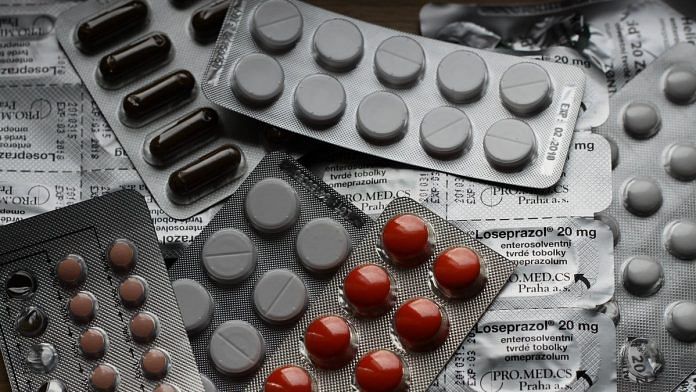New Delhi: The Narendra Modi government is considering a proposal to allow increase in the prices of medicines where the cost of raw materials has increased significantly, ThePrint has learnt.
The move is triggered by the significant increase in prices of active pharmaceutical ingredients (APIs), which are mostly imported from China.
While the prices of Chinese APIs, also known as bulk drugs, had been increasing since last year, they have spiralled phenomenally since January due to the Covid-19 outbreak in China, the world’s leading manufacturer of raw materials for drugs.
Drug-makers in India have reached out to the government with a proposal to bring in a law under which price hikes could be made possible due to unforeseen factors.
“We are receiving requests from the industry for DPCO amendment and its examination by the government is a continuous process…” National Pharmaceutical Pricing Authority (NPPA) chairman Shubhra Singh told ThePrint.
According to data collated by the Bulk Drug Manufacturers’ Association (BDMA), antibiotics azithromycin and ornidazole, anti-inflammatory drug nimesulide and antipyretic drug paracetamol have seen their prices jump between 60 and 190 per cent since January.
Apart from APIs, the prices of other raw materials — key starting material and intermediates — have also gone up.
According to the BDMA data, the price of chemical compound, 6APA, used to manufacture antibiotics, has swelled to Rs 1,875 per kg from Rs 400 per kg in February — an increase of more than 360 per cent.
Similarly, the price of Penicillin G, raw material used to manufacture antibiotics, have surged to Rs 750 per kg from Rs 487 per kg in February — posting a jump of over 50 per cent.
However, according to the laws that govern the pricing of medicines — Drug Pricing Control Order (DPCO) — drug-makers are not allowed to pass on the price hike to customers beyond 10 per cent annually.
Also read: Psoriasis injection ‘Itolizumab’ approved for Covid-19 treatment by India’s drug controller
Action required to prevent drug shortage in India: Industry
According to the BDMA, it is not only the prices of bulk drugs (or APIs) that are going up. “The prices of other raw materials, such as key starting materials and intermediates, have also increased. It’s high time for the government to intervene and bring some law to accommodate such wild price fluctuations,” said B.R. Sikri, vice president of BDMA who also heads lobbyist body Federation of Pharmaceutical Entrepreneurs (FOPE).
“If drug makers will be asked to absorb these price hikes for long, they may stop producing these essential products, such as top selling antibiotics, which will lead to drug shortage in the market. Financial viability of producing a commodity is also important. Losses cannot be taken, forever,” he said.
Another lobby of domestic pharmaceutical companies, the Indian Drug Manufacturers Association (IDMA), is also of the same opinion.
“Industry has requested NPPA to review the issue of price hike of formulations since there has been a steep rise in API prices. It has previously helped industry by invoking para 19. We again expect the intervention to help drug makers sustain the upwards surge in the prices of chinese imports,” said IDMA executive director Ashok Madan.
Current rule
The NPPA, till now, has used its powers under Paragraph 19 of DPCO, 2013, to allow one-time price increase.
Para 19 gives power to the NPPA to regulate the prices of drugs which, otherwise, are not under its mandate. This power can be used under extraordinary circumstances for public interest.
Only recently, on 2 July, the NPPA allowed pharmaceutical companies to take a one-time price increase on heparin injections by 50 per cent. The drug is used as a blood thinner and is playing an important role in treatment of Covid-19 patients.
The decision was taken by the regulator after receiving requests from companies to allow price hike considering the high input cost driven by expensive imported Chinese raw materials.
Also read: Jaipur’s SMS Hospital shows how ‘test, trace, isolate’ mantra can really work against Covid



